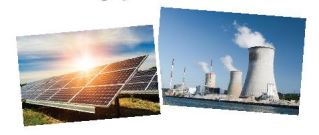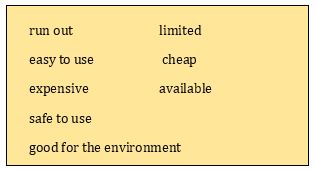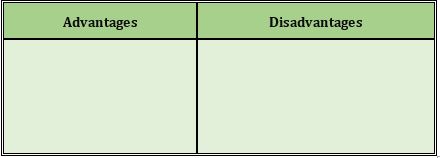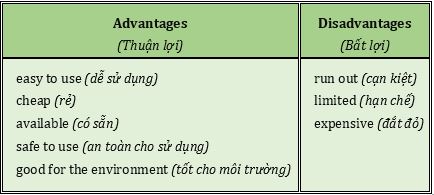Mời các em tham khảo nội dung bài học Unit 10 Tiếng Anh lớp 7 Kết nối tri thức phần Skills 1 do HOC247 biên soạn ngay bên dưới. Bài học này giúp các em luyện tập kỹ năng Reading và Speaking xoay quanh chủ đề về ưu, nhược điểm của các loại nguồn năng lượng. Chúc các em học hỏi thêm được nhiều kiến thức bổ ích nhé!
Tóm tắt bài
1.1. Unit 10 lớp 7 Reading Task 1
Work in pair. Discuss the following questions.
(Làm việc theo cặp. Thảo luận các câu hỏi sau.)
1. What are the main energy sources in Viet Nam? (Các nguồn năng lượng chính ở Việt Nam là gì?)
2. What type(s) of energy sources will we use in the future? (Chúng ta sẽ sử dụng (những) loại nguồn năng lượng nào trong tương lai?)
Guide to answer
1. They are water, coal, oil, gas, biogas. (Chúng là nước, than, dầu, khí đốt, khí sinh học..)
2. We will use solar energy and wind energy. (Chúng tôi sẽ sử dụng năng lượng mặt trời và năng lượng gió.)
1.2. Unit 10 lớp 7 Reading Task 2
Mr Lam is giving a lecture on energy sources. Read the text and choose the best option (A, B, or C) to complete the sentences.
(Ông Lâm đang giảng bài về các nguồn năng lượng. Đọc văn bản và chọn phương án tốt nhất (A, B hoặc C) để hoàn thành các câu.)
|
Hello, class. Today I'd like to tell you about two energy sources. They are non-renewable sources and renewable sources. Non-renewable sources are coal, oil and natural gas. We can use these sources to produce energy. They are cheap and easy to use. People use them a lot. But they are very limited and will run out soon. Renewable sources come from the sun, wind or water. When energy comes from the sun, we call it solar energy. Wind energy comes from the wind, and hydro energy comes from water. Renewable sources are available, clean and safe to use. But they are expensive to produce. In the future we will rely more on renewable energy sources. They are better for the environment and they will not run out. |
1. Non – renewable sources are cheap and _________.
A. available
B. easy to use
C. expensive
2. _________ come from the sun, wind or water.
A. Renewable sources
B. All energy sources
C. Non-renewable sources
3. When energy comes from water, we call it _________.
A. wind energy
B. solar energy
C. hydro energy
4. Renewable energy sources are better for _______.
A. the environment
B. our cars
C. hydro energy
Guide to answer
1. B - Non – renewable sources are cheap and easy to use.
(Các nguồn không thể tái tạo có giá thành rẻ và dễ sử dụng.)
2. A - Renewable sources come from the sun, wind or water.
(Các nguồn có thể tái tạo đến từ mặt trời, gió hoặc nước.)
3. C - When energy comes from water, we call it hydro energy.
(Khi năng lượng đến từ nước, chúng ta gọi nó là năng lượng thủy.)
4. A - Renewable energy sources are better for the environment.
(Các nguồn năng lượng tái tạo tốt hơn cho môi trường.)
Tạm dịch
Chào cả lớp. Hôm nay tôi muốn nói với các bạn về hai nguồn năng lượng. Chúng là những nguồn không thể tái tạo và những nguồn có thể tái tạo.
Các nguồn không thể tái tạo là than đá, dầu mỏ và khí đốt tự nhiên. Chúng ta có thể sử dụng những nguồn này để sản xuất năng lượng. Chúng rẻ và dễ sử dụng. Mọi người sử dụng chúng rất nhiều. Nhưng chúng rất hạn chế và sẽ hết sớm.
Các nguồn tái tạo đến từ mặt trời, gió hoặc nước. Khi năng lượng đến từ mặt trời, chúng ta gọi nó là năng lượng mặt trời. Năng lượng gió đến từ gió, và năng lượng thủy điện đến từ nước. Nguồn tái tạo có sẵn, sạch sẽ và an toàn để sử dụng. Nhưng chúng đắt tiền để sản xuất.
Trong tương lai, chúng ta sẽ dựa nhiều hơn vào các nguồn năng lượng tái tạo. Chúng tốt hơn cho môi trường và chúng sẽ không cạn kiệt.
1.3. Unit 10 lớp 7 Reading Task 3
Read the text again and answer the questions.
(Đọc lại văn bản và trả lời các câu hỏi.)
1. How many energy sources are there? What are they?
(Có bao nhiêu nguồn năng lượng? Chúng là gì?)
2. What do non-renewable sources include?
(Các nguồn không tái tạo bao gồm những gì?)
3. What are the advantages of renewable energy?
(Ưu điểm của năng lượng tái tạo là gì?)
4. What will we rely more on in the future?
(Chúng ta sẽ dựa vào điều gì nhiều hơn trong tương lai?)
Guide to answer
1. There are two energy sources. They are non-renewable sources and renewable sources.
(Có hai nguồn năng lượng. Chúng là những nguồn không thể tái tạo và những nguồn có thể tái tạo.)
2. Non-renewable sources are coal, oil and natural gas.
(Các nguồn không thể tái tạo là than đá, dầu mỏ và khí đốt tự nhiên.)
3. Renewable sources are available, clean and safe to use. But they are expensive to produce.
(Nguồn tái tạo có sẵn, sạch sẽ và an toàn để sử dụng. Nhưng chúng đắt tiền để sản xuất.)
4. In the future we will rely more on renewable energy sources.
(Trong tương lai, chúng tôi sẽ dựa nhiều hơn vào các nguồn năng lượng tái tạo.)
1.4. Unit 10 lớp 7 Speaking Task 4
Work in groups. Discuss and put the following words or phrases in the appropriate columns.
(Làm việc nhóm. Thảo luận và đặt các từ hoặc cụm từ sau vào các cột thích hợp.)
Guide to answer
1.5. Unit 10 lớp 7 Speaking Task 5
Work in pairs. Ask and answer questions about the advantages and disadvantages of different energy sources.
(Làm việc theo cặp. Hỏi và trả lời các câu hỏi về ưu điểm và nhược điểm của các nguồn năng lượng khác nhau.)
Example
A: What are the advantages of hydro energy?
(Những lợi thế của năng lượng thủy điện là gì?)
B: It's available, clean and safe to use.
(Nó có sẵn, sạch sẽ và an toàn để sử dụng.)
A: What are its disadvantages?
(Nhược điểm của nó là gì?)
B: It's expensive to produce.
(Nó đắt tiền để sản xuất.)
Guide to answer
A: What are the advantages of energy from oil?
B: It can be used to power machinery.
A: What are its disadvantages?
B: It's a non-renewable source of energy and pollutes the environment. It's also expensive.
Tạm dịch:
A: (Ưu điểm của năng lượng từ dầu mỏ là gì?)
B: (Nó có thể được sử dụng để cung cấp năng lượng cho máy móc)
A: (Nhược điểm của nó là gì?)
B: (Nó là một nguồn năng lượng không thể tái tạo và gây ô nhiễm môi trường.)
Bài tập minh họa
Read the passage and answer the questions below. (Đọc đoạn văn và trả lời các câu hỏi bên dưới.)
|
One major advantage with the use of renewable energy is that as it is renewable therefore it is sustainable and so will never run out. Renewable energy facilities generally require less maintenance than traditional generators. Their fuel being derived from natural and available resources reduces the costs of operation. Even more importantly, renewable energy produces little or no waste products such as carbon dioxide or other chemical pollutants, so has minimal impact on the environment. It is easy to recognize the environmental advantages of utilizing the alternative and renewable forms of energy but we must also be aware of the disadvantages. One disadvantage with renewable energy is that it is difficult to generate the quantities of electricity that are as large as those produced by traditional fossil fuel generators. This may mean that we need to reduce the amount of energy we use or simply build more energy facilities. It also indicates that the best solution to our energy problems may be to have a balance of many different power sources. Hydro generators need rain to fill dams to supply flowing water. Wind turbines need wind to turn the blades, and solar collectors need clear skies and sunshine to collect heat and make electricity. Another advantage of renewable energy sources is the reliability of supply. Renewable energy often relies on the weather for its source of power. The current cost of renewable energy technology is also far in excess of traditional fossil fuel generation. This is because it is a new technology and as such has extremely large capital cost. |
1. What is the most important advantage of renewable resources?
2. Which is less expensive to operate, non-renewable or renewable energy? Why?
3. What does wind energy need to generate power?
4. Why is the total cost of renewable energy technology far more than that of fossil fuels?
Key
1. It will never run out.
2. Renewable energy. Because their fuel being derived from natural and available resources reduces the costs of operation.
3. Wind turbines need wind to turn the blades.
4. Because it is a new technology and as such has extremely large capital cost.
Luyện tập
3.1. Kết luận
Qua bài học này các em cần ghi nhớ các từ vựng sau:
- run out (ph.v) cạn kiệt
- limited (adj) có giới hạn
- available (adj) sẵn có
- safe to use : an toàn cho sử dụng
- good for the environment: tốt môi trường
- rely on: dựa vào, phụ thuộc
3.2. Bài tập trắc nghiệm Unit 10 - Skills 1
Như vậy là các em đã xem qua bài giảng Unit 10 - Skills 1 chương trình Tiếng Anh lớp 7 Kết nối tri thức. Để củng cố kiến thức bài học mời các em tham gia bài tập trắc nghiệm Trắc nghiệm Unit 10 lớp 7 Kết nối tri thức Skills 1 - Kỹ năng 1.
-
- A. the air and the land
- B. the oceans and the sun
- C. the sun and the land
- D. all natural resources
-
- A. two
- B. three
- C. four
- D. five
-
- A. burnt quickly
- B. replaced quickly
- C. divided properly
- D. used quickly
Câu 4-10: Mời các em đăng nhập xem tiếp nội dung và thi thử Online để củng cố kiến thức về bài học này nhé!
Hỏi đáp Unit 10 - Skills 1 Tiếng Anh 7
Trong quá trình học tập nếu có thắc mắc hay cần trợ giúp gì thì các em hãy comment ở mục Hỏi đáp, Cộng đồng Tiếng Anh HOC247 sẽ hỗ trợ cho các em một cách nhanh chóng!
Chúc các em học tập tốt và luôn đạt thành tích cao trong học tập!
-- Mod Tiếng Anh 7 HỌC247









